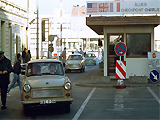Toward a 'Normal' Political Culture
3 Nov 2009
By Dan Hough for ISN
On 9 November 1989, the world watched as Germans celebrated one of the most memorable events of the 20th century – the fall of the Berlin Wall. Citizens of the soon-to-be-defunct German Democratic Republic (GDR) euphorically streamed westward. Euphoria, however, quickly faded, while the political, economic and social challenges of unification loomed large.
First, and most importantly, the East German economy was in a much more desolate condition following unification than had initially been believed. Facing the prospect of considerable tax hikes, westerners soon balked at the cost of economic transformation, which they essentially underwrote. Westerners were also increasingly frustrated by what they perceived as eastern helplessness. They felt that they had worked hard over many years for their prosperity, and perceived many easterners as nothing more than ‘freeriders.’
Many easterners, for their part, were perplexed that westerners seemed apathetic about the unification project. Easterners felt that grumbling about who footed the bill seemed petty, particularly since jobs were quickly vanishing and economic growth was elusive in the East. Seeds of discontent were sown, and it wasn’t long before the nicknames Besser-Wessi (know-it-all westerner) and Jammerossi (moaning easterner) became common currency.
Through the 1990s, the economic as well as attitudinal gap remained. The East even had its own political party, the former communist Party of Democratic Socialism (PDS), which despite its history as the ruling party of the GDR, regularly polled 20 percent of the vote. It spoke to easterners’ dissatisfaction with their economic problems, as well as a feeling that politics still moved very much in step with a western German agenda. The PDS never called for turning back the clock, but it was not averse to pointing out the injustices bourne by easterners; in other words the party incorporated the feelings of resentment and unhappiness that had become associated with the unification process.
Whither dichotomous discourse?
Twenty years after the fall of the Wall differences between East and West certainly remain: Unemployment is roughly twice as high in the East as in the West; levels of growth have been consistently higher in the 10 western states; productivity is greater in the West, as is GDP. Just about all other economic and political indicators highlight continuing differences between the regions.
It is noteworthy, however, that these issues received barely a mention in the 2009 federal election. In fact, the same could arguably be said about the 2005 election. The 2009 election felt almost like an election without a campaign, so placid and well-mannered were the debates that preceded it. Chancellor Angela Merkel from the center-right Christian Democrats went head-to-head with Foreign Minister Frank-Walter Steinmeier from the Social Democratic Party (SPD), and issues of competence, reliability and trust dominated. Germany’s two biggest parties seemed almost happy to carry on in government together rather than to fight for their apparently preferred coalition options, whether it be the CDU with the (liberal) Free Democrats or the SPD with the Greens. The issue of eastern Germany’s socio-economic trials and tribulations didn’t even receive much mention in the newly revamped Left Party’s (the successor to the PDS) discourse.
Political discourse specifically about the East, then, seems to have faded in recent years for three reasons. First, and most negative, political parties have tried – and largely failed – to articulate a persuasive narrative and effective policies that alleviate the East’s difficulties. Attacking the East’s unemployment problem or kick-starting the East’s flagging economy is not easy, and the efforts of the major parties to address these issues have largely been unsuccessful. Now, the parties have simply run out of ideas.
Secondly, the East no longer exists (if indeed it ever did) as one unit. Some parts of the East, mainly around the larger urban centers, have quietly achieved success. Underlying structural problems are clearly still common, but exceptions do exist: While Silicon Saxony purrs along nicely, the Ueckermark continues to struggle; while Jena is a center for high technology industries, the former coalfields of Saxony-Anhalt remain hubs of discontent and disillusion. Indeed, the East is, and always has been, much more diverse than many acknowledge.
The third and arguably most important point, however, is that many of the East’s problems are now perceived as Germany’s problems. They may well be more obvious in the East, but they are evident more or less everywhere. And when a problem is all-German, then the solution must have all-German roots too.
Thinking as one
Therefore, parties and politicians are not ignoring the East; they now understand that the answers to the East’s problems lie in solving bigger and broader dilemmas. It is not, for example, just in the East that labor costs are high; western Germany suffers from much the same phenomenon. Domestic demand is weak across all 16 of Germany’s states, not just the six (including Berlin) eastern ones. Growth rates remain low everywhere, just as feelings of insecurity and frustration do. Indeed, it is not only easterners who talk of Politikverdrossenheit (disenchantment with politics) or even Politikverachtung (contempt for politics); they are commonly (over-)discussed in western Germany as well.
Thus, Germany, like any state, faces an array of challenges. But it now does so more or less as one unit – and political discourse has begun increasingly to reflect this. Those on the (far) left bemoan capitalism’s apparent injustices; those on the right plead for greater economic liberalization and a streamlining of the welfare state. The usual variety of partisan politics abounds, and a significant number of citizens – just as in other countries – feel disillusioned with the political process. While disenchantment is no excuse for complacency, it is a symptom of something Germany has never really experienced before: normality.

